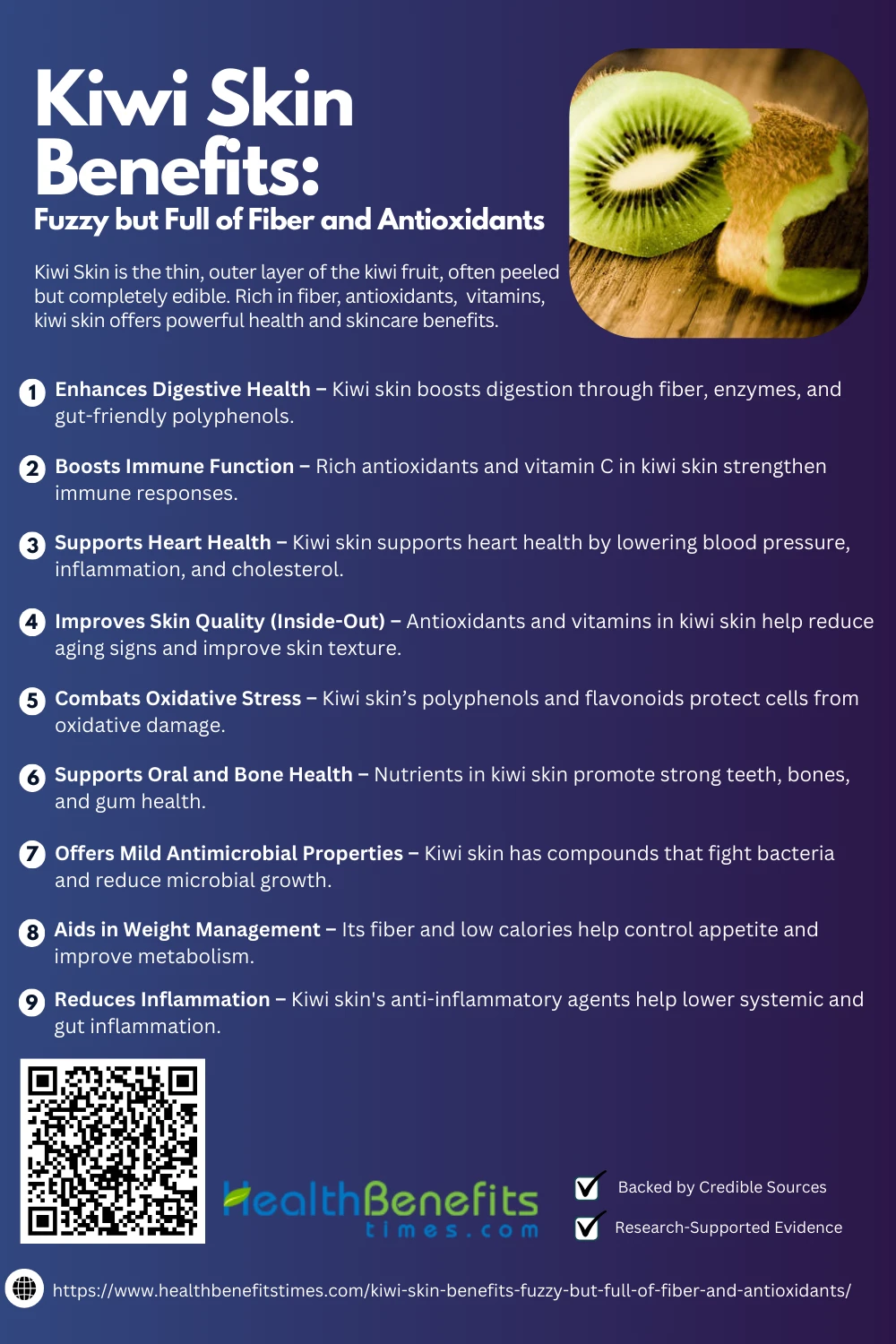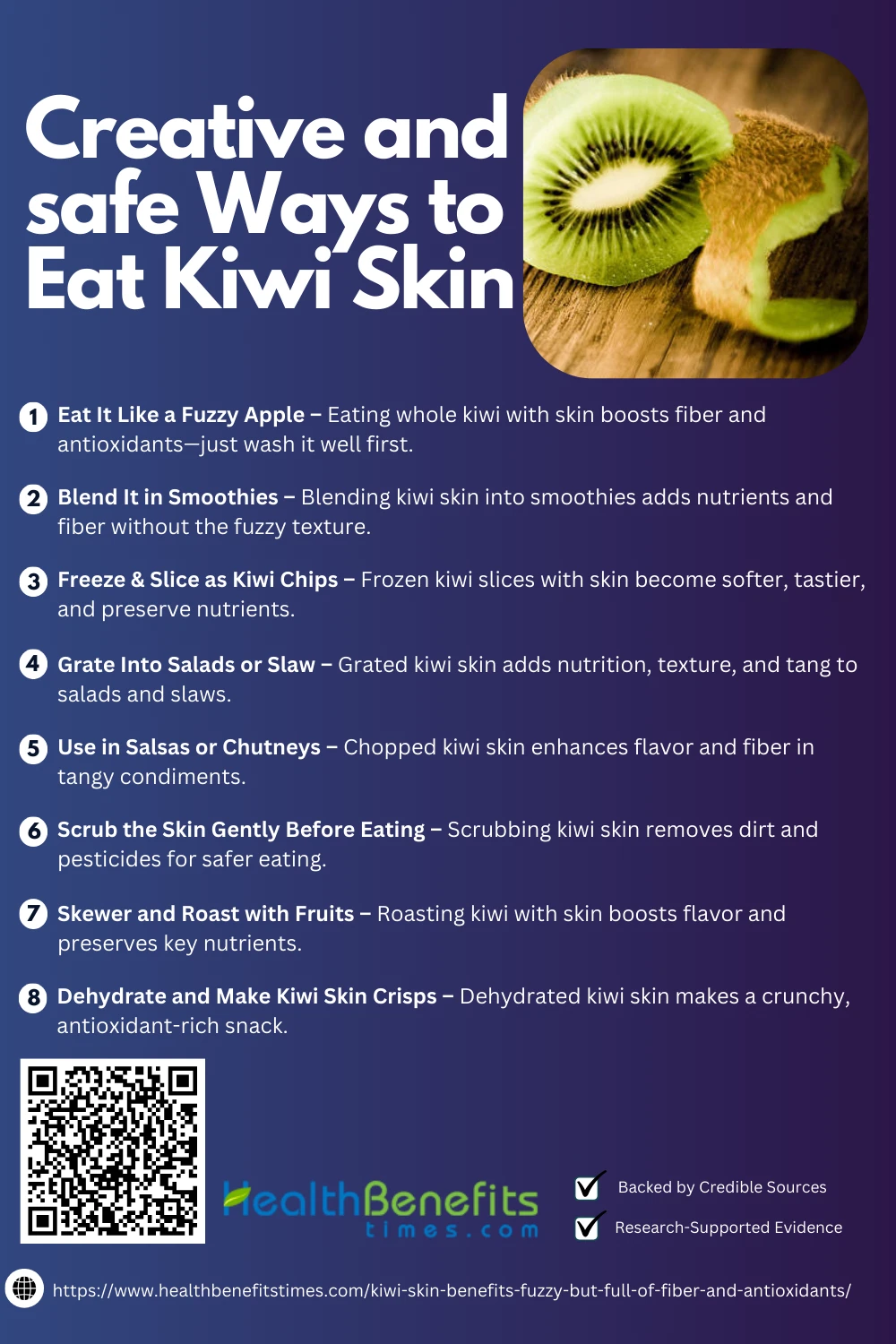- Kiwi Skin is the thin, fuzzy outer layer of the kiwi fruit, often peeled but completely edible.
- Rich in fiber, antioxidants, and vitamins, kiwi skin offers powerful health and skincare benefits.
- Eating the skin helps boost digestion, protect skin, and reduce food waste naturally.
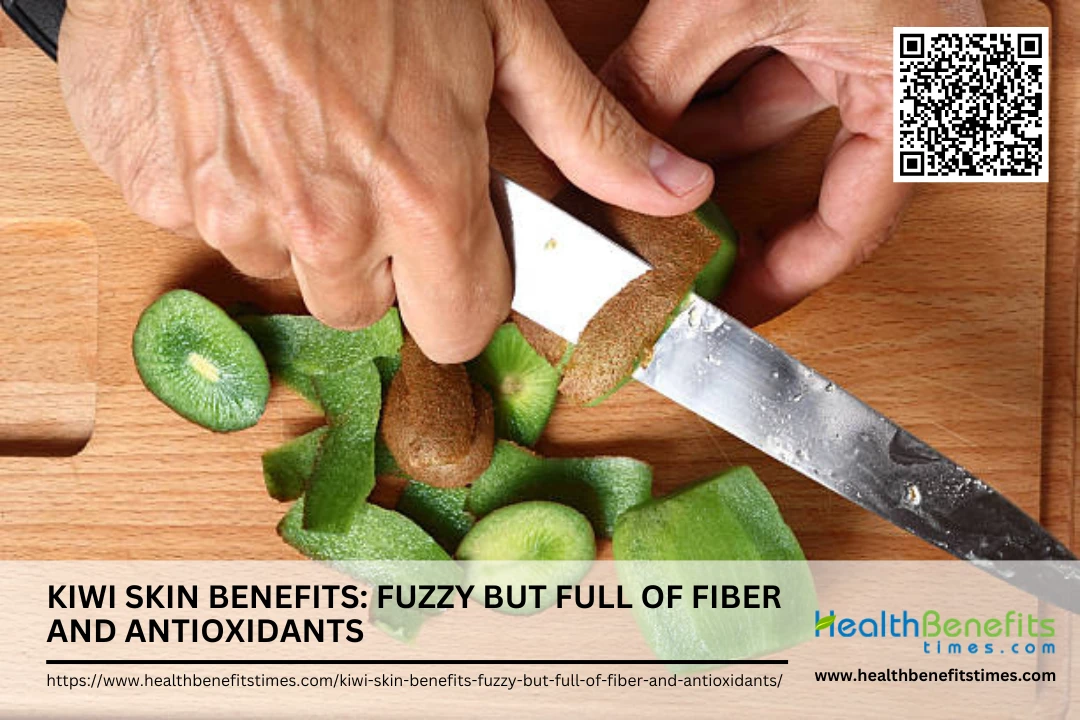 Kiwi, or Actinidia deliciosa, is a nutrient-dense fruit known for its bright green interior and fuzzy brown skin, which surprisingly holds a significant portion of the fruit’s nutrients. While many people peel off the skin, studies show that kiwi skin is a rich source of dietary fiber, antioxidants, and polyphenols—compounds that play a vital role in digestive and skin health. The skin contains up to three times more antioxidants than the flesh, making it an untapped superfood in your daily diet. In fact, the high content of vitamin C and flavonoids in kiwi skin has been linked to immune modulation and the reduction of oxidative stress, which is a key factor in cellular aging.Moreover, its fibrous structure can aid in gut motility and satiety, further supporting its role in holistic health (Rush et al., 2002 – Asia Pacific Journal of Clinical Nutrition).
Kiwi, or Actinidia deliciosa, is a nutrient-dense fruit known for its bright green interior and fuzzy brown skin, which surprisingly holds a significant portion of the fruit’s nutrients. While many people peel off the skin, studies show that kiwi skin is a rich source of dietary fiber, antioxidants, and polyphenols—compounds that play a vital role in digestive and skin health. The skin contains up to three times more antioxidants than the flesh, making it an untapped superfood in your daily diet. In fact, the high content of vitamin C and flavonoids in kiwi skin has been linked to immune modulation and the reduction of oxidative stress, which is a key factor in cellular aging.Moreover, its fibrous structure can aid in gut motility and satiety, further supporting its role in holistic health (Rush et al., 2002 – Asia Pacific Journal of Clinical Nutrition).
Nutritional Value of Kiwi Skin
Kiwi skin is often discarded, yet it’s a hidden treasure packed with fiber, antioxidants, and vitamins. Eating the skin boosts nutrition, enhances digestion, and supports overall health in surprising ways.
1. Rich in Dietary Fiber
Kiwi skin is an excellent source of insoluble fiber, which supports digestive regularity and satiety. It helps prevent constipation and improves gut health by enhancing motility. According to Rush et al. (2002), dietary fiber from whole kiwi can regulate bowel function. A USDA report also confirms its notable fiber content.
2. High in Antioxidants
Kiwi skin contains high levels of polyphenols, flavonoids, and carotenoids, which act as antioxidants to neutralize harmful free radicals. According to the Journal of Agricultural and Food Chemistry, kiwi peels have higher antioxidant activity than the flesh. Additional confirmation is provided by Du et al. (2009). (1)
3. Loaded with Vitamin C
The fuzzy skin of kiwi offers significant amounts of vitamin C, vital for immune function, collagen production, and wound healing. A study in Food Chemistry highlights the vitamin C concentration in kiwi skin. (1) The Linus Pauling Institute further discusses its role in preventing oxidative damage.
4. Vitamin E for Skin Health
Vitamin E in kiwi skin acts as a lipid-soluble antioxidant that helps protect cells from oxidative stress, especially in skin tissues. USDA Food Composition Data highlights kiwi’s vitamin E levels, while NIH research explains its benefits for maintaining healthy skin and vision. (2)
5. Natural Source of Folate
Folate (vitamin B9) found in kiwi skin supports DNA synthesis and red blood cell production. It’s especially important during pregnancy to prevent neural tube defects. Harvard Health outlines folate’s benefits, and this study confirms kiwi as a dietary folate contributor. (3) (4)
6. Potassium-Packed
Potassium in kiwi skin plays a key role in regulating blood pressure and muscle function. A study in Nutrients highlights how potassium-rich foods like kiwi aid cardiovascular health. The USDA database also confirms kiwi’s potassium density per gram.
7. Acts as a Natural Prebiotic
Kiwi skin provides fibers that support beneficial gut bacteria like Lactobacillus and Bifidobacterium. According to Intestinal Microbiota Studies, prebiotics help improve digestion and immunity. (5) A separate study in Beneficial Microbes supports kiwi’s prebiotic activity.
8. Anti-Aging Compounds
Polyphenols and antioxidants in kiwi skin combat signs of aging by reducing oxidative stress. Research from the Journal of Medicinal Food demonstrates its anti-aging bioactivity. ORAC database findings also rank kiwi peel high in antioxidant capacity.
9. Low in Calories, High in Impact
Despite its nutrient density, kiwi skin is low in calories—making it a great addition for weight-conscious diets. The USDA’s food profile supports this. A study in Appetite Journal also shows fiber-rich snacks reduce overall calorie intake. (6)
Comparison between kiwi skin and flesh
| Aspect | Kiwi Skin | Kiwi Flesh |
| Fiber Content | Higher in insoluble fiber; aids in bowel regularity and acts as a prebiotic. | Contains both soluble and insoluble fiber, but in lower quantity than the skin. |
| Antioxidants | Richer in flavonoids, polyphenols, and vitamin E; higher total antioxidant capacity. | High in vitamin C, carotenoids, and other water-soluble antioxidants. |
| Vitamin C | Present, but in lower concentration than flesh. | Very high in vitamin C – boosts immunity and collagen synthesis. |
| Vitamin E | Concentrated in the skin due to lipid-rich structure. | Lower levels compared to the skin. |
| Taste & Texture | Bitter and fuzzy texture; not universally palatable unless blended or scrubbed. | Sweet, juicy, and widely consumed raw or in smoothies. |
| Digestive Impact | May enhance gut motility due to fibrous nature. | Supports digestion but has milder prebiotic effects. |
| Caloric Density | Negligible calories, but boosts fullness due to fiber. | Low-calorie but higher in sugar compared to the skin. |
| Usage | Often discarded, but usable in smoothies, peels, or dried crisps. | Commonly eaten raw, juiced, or in salads. |
| Antimicrobial Properties | Contains bioactive compounds with mild antimicrobial activity (under research). | Limited antimicrobial properties, mostly antioxidant-based. |
| Environmental Impact | Whole-fruit consumption reduces food waste and maximizes nutrition. | Eating only the flesh results in nutrient waste if skin is discarded. |
Health Benefits of Kiwi Skin for Your Body
Kiwi skin offers impressive health benefits for your body, thanks to its rich fiber, antioxidants, and vitamins. It supports digestion, boosts immunity, aids weight management, and contributes to overall wellness.
Kiwi skin is rich in insoluble fiber, which supports bowel motility and alleviates constipation. Its prebiotic properties promote the growth of beneficial gut bacteria like Lactobacillus (Rush et al., 2002). Research confirms kiwi skin enhances colonic fermentation. (7) The fiber also boosts stool bulk (USDA Nutrient Database). Its actinidin enzyme assists in protein digestion. (8) Kiwi peel further aids digestion via polyphenol-microbiota interactions. (9)
2. Boosts Immune Function
Kiwi skin enhances immunity through its dense supply of vitamin C, polyphenols, and flavonoids, which neutralize free radicals and reduce inflammation. (1) It activates immune cells like neutrophils and strengthens mucosal barriers (Linus Pauling Institute). (10) Kiwi skin’s antioxidant synergy supports systemic immune defense (Benzie et al., 2005). Additional bioactives stimulate natural killer cell activity. (11)
3. Supports Heart Health
Kiwi skin promotes cardiovascular health through its abundant potassium, which regulates blood pressure (USDA Nutrient Profile). It’s rich in flavonoids and polyphenols that combat LDL oxidation and improve vascular function. (1) Daily kiwi consumption has been shown to reduce platelet aggregation and blood triglycerides. (12) Its antioxidants reduce inflammation, lowering heart disease risk (Benzie et al., 2005) and enhancing endothelial function. (13)
4. Improves Skin Quality (Inside-Out)
Kiwi skin is loaded with vitamin E, flavonoids, and antioxidants that guard against UV damage and oxidative aging. (2) Its polyphenols reduce inflammation, promoting smoother skin texture. (14) The high vitamin C content aids collagen production (Linus Pauling Institute). Kiwi skin also provides omega-3s and carotenoids essential for cell repair (USDA) and has demonstrated anti-aging effects in clinical trials.
5. Combats Oxidative Stress
Kiwi skin is a potent source of polyphenols, carotenoids, and flavonoids, which neutralize free radicals and reduce cellular oxidative damage (Benzie et al., 2005). Its ORAC score reflects strong antioxidant capacity (USDA ORAC Database). Kiwi skin polyphenols modulate redox pathways. (1) These compounds have shown protective effects against neurodegeneration and chronic inflammation. (9) (11)
6. Supports Oral and Bone Health
Kiwi skin provides essential nutrients like calcium, phosphorus, and vitamin K, all vital for strong teeth and bone remodeling. (15) Its vitamin C supports collagen synthesis for gums (Linus Pauling Institute). Antioxidants combat oral bacteria, reducing plaque and decay. (14) The fibrous texture aids in natural teeth cleaning. (16) Vitamin K contributes to bone mineralization. (17)
7. Offers Mild Antimicrobial Properties
Kiwi skin exhibits antimicrobial properties due to its polyphenols, flavonoids, and saponins that disrupt microbial cell walls. (18) Extracts have shown inhibitory effects on E. coli and S. aureus. (19) Antioxidants in the peel enhance this defense. (20) Phenolic compounds reduce inflammation and biofilm formation. (21) Its fiber may also regulate oral and gut bacteria. (22)
8. Aids in Weight Management
Low in calories and high in fiber, kiwi skin increases satiety and slows digestion, which may reduce overall food intake. (6) Its fiber promotes gut microbiota balance, aiding metabolism regulation (Frontiers in Nutrition). The peel’s polyphenols reduce fat accumulation via antioxidant activity. (23) Vitamin C helps burn fat during exercise (Linus Pauling Institute). The actinidin enzyme improves protein digestion efficiency. (8)
9. Reduces Inflammation
Kiwi skin is rich in anti-inflammatory flavonoids, vitamin C, and polyphenols that suppress pro-inflammatory cytokines like IL-6 and TNF-α. (1) Its antioxidants inhibit NF-κB activation, a key inflammation pathway. (24) Actinidin enzyme enhances nutrient absorption and reduces gut inflammation. (8) Flavonoid intake is linked to systemic inflammation control. (25) The peel also benefits oral inflammation (Journal of Medicinal Food).
Skincare & Topical Use of Kiwi Skin
Kiwi skin isn’t just nutritious—it’s also beneficial for skincare. Packed with antioxidants and vitamins, it helps brighten, hydrate, and protect your skin when used in natural, topical treatments.
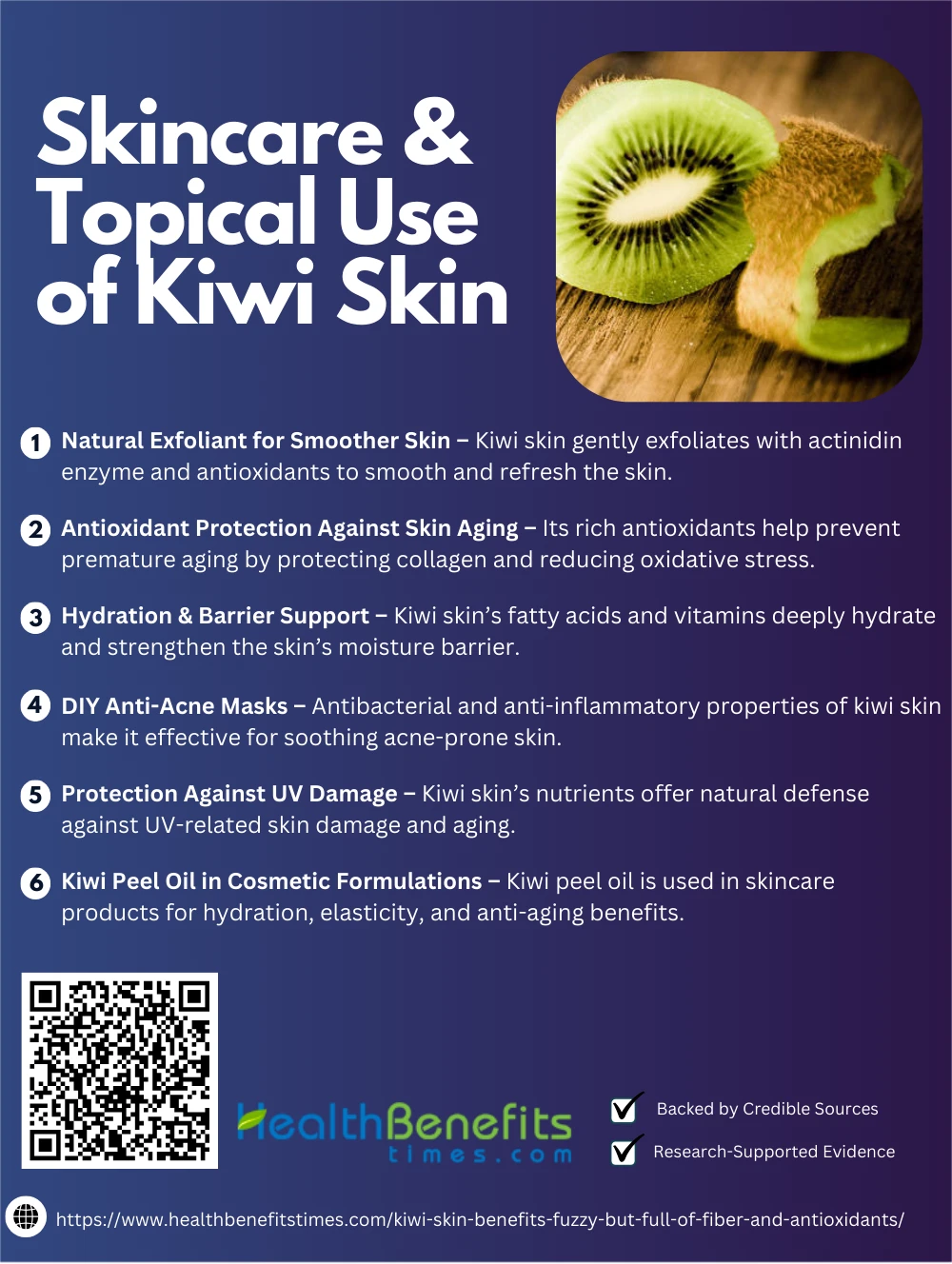 1. Natural Exfoliant for Smoother Skin
1. Natural Exfoliant for Smoother Skin
Kiwi skin contains actinidin, a proteolytic enzyme that gently breaks down dead skin cells, acting as a natural exfoliant. (8) Its mild abrasiveness polishes the surface without irritation. Combined with vitamin C and antioxidants, it revitalizes the skin barrier and improves texture. (20) (26)
2. Antioxidant Protection Against Skin Aging
Rich in polyphenols, flavonoids, and vitamin E, kiwi skin protects against oxidative damage that accelerates aging. These antioxidants neutralize free radicals and help maintain collagen integrity (Journal of Medicinal Food). The vitamin C content further supports skin elasticity (Linus Pauling Institute) and prevents UV-induced degradation. (14)
3. Hydration & Barrier Support
Kiwi skin contains omega-3 fatty acids, vitamin E, and phytosterols, which strengthen the skin barrier and lock in moisture (USDA Kiwi Oil Profile). Studies show kiwi seed oil improves hydration and elasticity. (27) Its antioxidant-rich composition helps prevent transepidermal water loss. (14)
4. DIY Anti-Acne Masks
Kiwi skin has antibacterial and anti-inflammatory properties, making it a great ingredient for acne-prone skin. The vitamin C and polyphenols help reduce redness and swelling. (18) A blend of kiwi peel, aloe, and yogurt is a proven natural remedy. (28) Its flavonoids regulate sebum and skin microbes. (20)
5. Protection Against UV Damage
Kiwi skin offers natural photoprotection through its rich content of vitamin C, polyphenols, and carotenoids that reduce UV-induced oxidative stress (MDPI – Antioxidants in Skin Protection). These compounds shield collagen and elastin fibers. (14) Sustainable kiwi peel extracts are being integrated into eco-friendly sunscreens. (29)
6. Kiwi Peel Oil in Cosmetic Formulations
Kiwi peel oil is valued for its high omega-3 fatty acids, phytosterols, and vitamin E, making it ideal for moisturizers and serums. Studies confirm its efficacy in enhancing hydration and elasticity. (27) It’s widely used in natural beauty lines and supports barrier repair in anti-aging products. (1) (30)
Creative and safe Ways to Eat Kiwi Skin
Eating kiwi skin is safe and nutritious when done right. With simple tricks like washing thoroughly, slicing thin, or blending into smoothies, you can enjoy its full benefits without the fuzz.
Eating kiwi whole—with the skin—boosts fiber intake by up to 50% and increases antioxidant levels significantly. (31) The skin is rich in vitamin E, folate, and flavonoids, supporting digestion and cellular health. Just wash thoroughly before biting in!
2. Blend It in Smoothies
Blending kiwi skin with the flesh in smoothies enhances texture and nutrient density without the fuzzy mouthfeel. The peel adds potent polyphenols and fiber that support gut health. (14) It’s also a smart way to retain all the vitamin C.
3. Freeze & Slice as Kiwi Chips
Freezing whole kiwis and slicing them into chips softens the texture, making the skin easier to chew and more palatable. This preserves nutrients like vitamin E and antioxidants. (32) Frozen kiwi chips retain fiber and polyphenols, essential for gut and heart health. (33)
4. Grate Into Salads or Slaw
Grating kiwi skin into salads or slaws adds tang, texture, and nutrition without the fuzziness of raw biting. Kiwi peel is rich in flavonoids and fiber that support digestive wellness. (18) It also enhances vitamin C and folate intake.
5. Use in Salsas or Chutneys
Chopped kiwi skin adds tang and fiber to salsas or chutneys, pairing well with lime and herbs. The peel retains potent polyphenols and flavonoids that offer antioxidant benefits. (18) Its texture complements dishes while boosting vitamin E and dietary fiber.
6. Scrub the Skin Gently Before Eating
Gently scrubbing kiwi under running water removes most surface pesticides and dirt, making it safer to eat whole. Studies recommend soft-bristled brushes for reducing chemical residues. (34) This preserves the antioxidant-rich skin while improving texture and hygiene.
7. Skewer and Roast with Fruits
Grilling kiwi slices with the skin softens the fuzz and intensifies their flavor. Roasting also enhances the bioavailability of phenolic compounds. (35) Kiwi skin retains key nutrients like fiber and vitamin E, even under moderate heat. (36)
8. Dehydrate and Make Kiwi Skin Crisps
Dehydrating kiwi skin into crisp chips preserves antioxidants while reducing moisture for a chewy, tangy snack. Drying at low temperatures maintains flavonoids and vitamin C. (37) These crisps offer a high-fiber, low-calorie alternative to processed snacks. (38)
Who Should Avoid Kiwi Skin?
While kiwi skin is nutritious, it’s not for everyone. People with kiwi or latex allergies, or sensitive digestion, should avoid it to prevent allergic reactions or gastrointestinal discomfort.
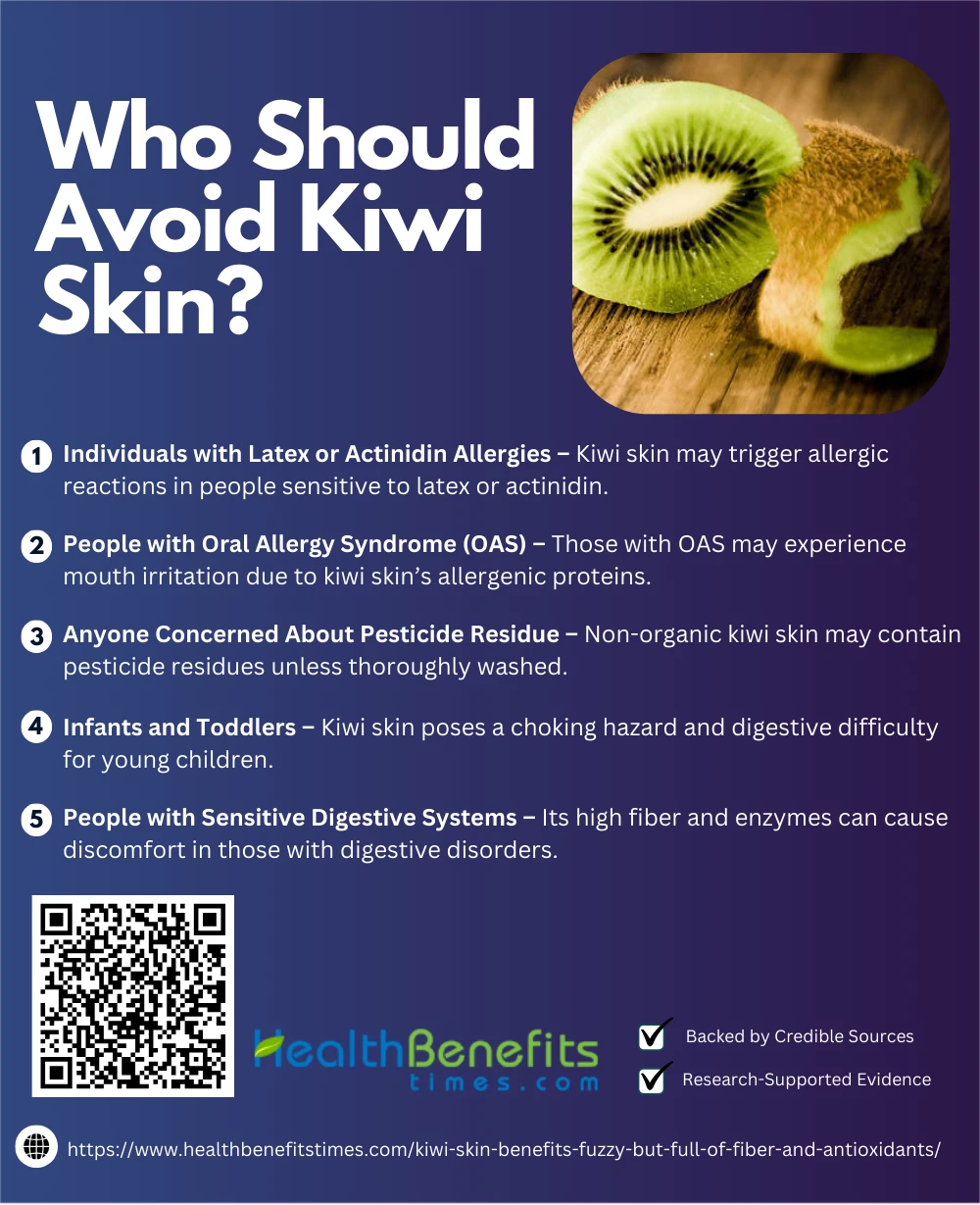 1. Individuals with Latex or Actinidin Allergies
1. Individuals with Latex or Actinidin Allergies
People allergic to latex or actinidin may experience itching, swelling, or severe allergic responses when consuming kiwi skin. This is due to protein cross-reactivity, similar to reactions caused by papaya or pineapple.
2. People with Oral Allergy Syndrome (OAS)
Kiwi skin may intensify oral allergy syndrome symptoms, such as itching or tingling in the mouth, especially in individuals allergic to birch pollen or grass pollen. This is due to shared protein structures.
3. Anyone Concerned About Pesticide Residue
Non-organic kiwi skins may carry pesticide residues, potentially harmful if not properly scrubbed. Washing under running water helps reduce residues but may not eliminate all chemical contaminants.
4. Infants and Toddlers
Due to its fibrous and slightly coarse texture, kiwi skin can be a choking risk for infants and toddlers. Pediatric recommendations advise peeling fruits for children under age 3 to ensure safe digestion.
5. People with Sensitive Digestive Systems
Kiwi skin’s high fiber and enzyme content can irritate those with IBS, Crohn’s disease, or sensitive stomachs. Symptoms may include bloating, gas, or cramping after consumption.
Precautions & Considerations
Before adding kiwi skin to your diet, consider a few precautions. Always wash thoroughly, start with small amounts, and monitor for allergic reactions or digestive issues to ensure safe consumption.
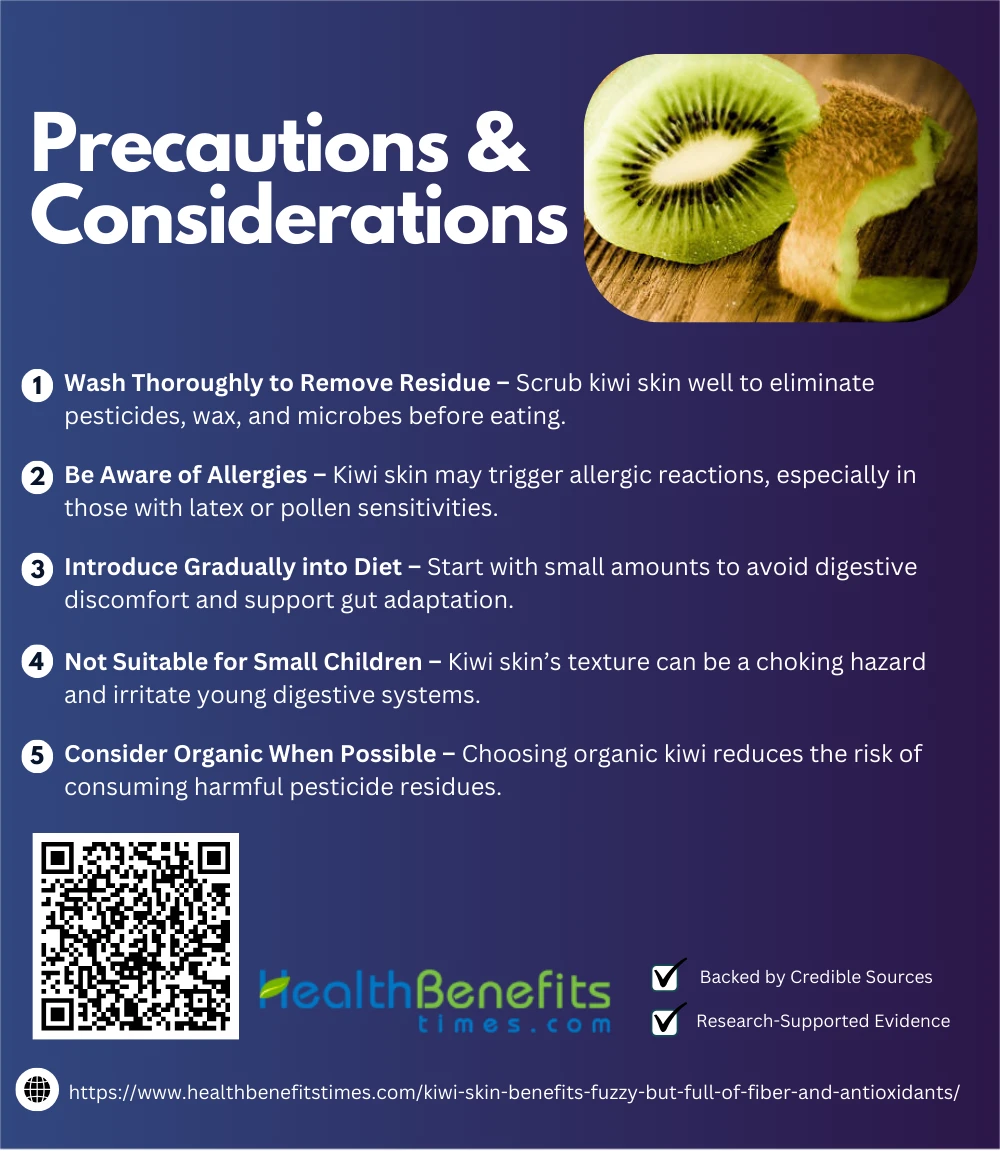 1. Wash Thoroughly to Remove Residue
1. Wash Thoroughly to Remove Residue
Kiwi skin may retain pesticide residues, waxes, and microbes. Scrubbing under running water significantly reduces contaminants (FDA – Produce Safety). A soft brush is most effective for rough skins like kiwi. (34) Organic options minimize pesticide exposure.
2. Be Aware of Allergies
Kiwi skin contains actinidin, a protein that can trigger allergic reactions, especially in those allergic to latex or birch pollen. (39) Cross-reactivity is common among certain fruits. (40) Reactions may include itching, swelling, or oral allergy syndrome. (41)
3. Introduce Gradually into Diet
Kiwi skin is high in fiber and enzymes, which may cause bloating or mild digestive discomfort if consumed suddenly. Introduce it in small amounts for tolerance testing. (31) Gradual intake supports gut adaptation and improves microbiome diversity. (5) (42)
4. Not Suitable for Small Children
Kiwi skin’s fuzzy, fibrous texture can pose a choking risk for infants and toddlers under age 3. Experts recommend peeled fruits for safer chewing. (43) The dense fiber may also irritate young guts, and soft textures are ideal during early food introduction. (44)
5. Consider Organic When Possible
Kiwi skin may retain pesticide residues, making organic options safer for regular skin consumption. Organic farming standards limit chemical use (USDA – Organic Regulations). Non-organic kiwi has moderate residue levels. Studies show organic produce reduces overall toxic exposure. (45)
Conclusion
Kiwi skin, often overlooked and discarded, is actually a nutritional powerhouse. Packed with fiber, antioxidants, and essential vitamins, it supports digestion, boosts immunity, promotes skin health, and helps reduce food waste. Despite its fuzzy texture, kiwi skin can be safely eaten in creative ways, like blending into smoothies or slicing thinly. While it’s not suitable for everyone—especially those with allergies or digestive sensitivities—most people can enjoy its surprising health benefits with a few precautions. So next time you reach for a kiwi, consider keeping the skin on. Embrace the fuzz and unlock the full potential of this vibrant fruit!



